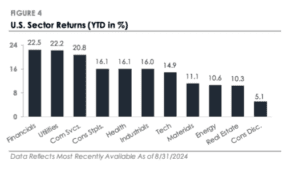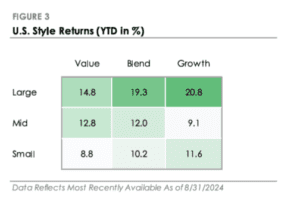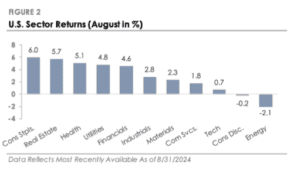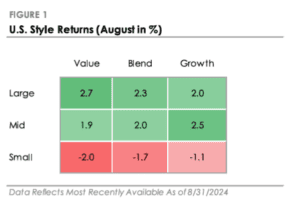Federal Reserve Set to Begin Cutting Interest Rates in September
Monthly Market Summary
- The S&P 500 Index returned +2.3% in August, outperforming the Russell 2000 Index’s -1.7% return. Nine of the eleven S&P 500 sectors traded higher, led by Consumer Staples, Real Estate, Health Care, and Utilities.
- Corporate investment-grade bonds produced a +1.9% total return as Treasury yields declined, slightly outperforming corporate high-yield’s +1.5% total return.
- International stock performance was mixed. The MSCI EAFE developed market stock index returned +3.3% and outperformed the S&P 500, while the MSCI Emerging Market Index returned +1.0%.
Stocks Rebound Following an Early-Month Selloff
Stocks traded higher in August despite an early month selloff. The S&P 500 dropped over -5% in the first week after a report showed unemployment rose to 4.3% in July. Small-cap stocks underperformed as investors pulled back from riskier assets amid volatility. However, financial markets quickly stabilized and climbed throughout the month. The S&P 500 recovered all its losses, ending the month less than -1% below its all-time high from mid-July. The Nasdaq 100 Index, which includes the artificial intelligence companies that drove the stock market higher in early 2024, lagged the broader market. In the bond market, Treasury yields fell for the second consecutive month, driven by expectations for deeper rate cuts in response to rising unemployment. Bonds traded higher for a fourth consecutive month as Treasury yields declined and investors rushed to lock in current fixed income yields ahead of the first interest rate cut.
Fed Set to Cut Interest Rates as Focus Shifts to the Labor Market
Investors expect the Federal Reserve to start cutting interest rates at its next meeting on September 17th. Fed Chair Jerome Powell signaled the move at last month’s Jackson Hole conference by saying, “The time has come for policy to adjust. The direction of travel is clear, and the timing and pace of rate cuts will depend on incoming data, the evolving outlook and the balance of risks.” It was the Fed’s clearest policy signal since it last raised interest rates 14 months ago.
The Fed’s transition to cutting interest rates comes as its focus shifts from lowering inflation to supporting the labor market. Since the last rate hike in July 2023, inflation has dropped from 3.3% to 2.9%, while unemployment has risen from 3.5% to 4.3%. The Fed is more confident that inflation will return to its 2% target but is concerned about the overall health of the U.S. labor market. The key question is how much and how quickly the Fed will lower interest rates. Investors anticipate that the Fed will cut rates by approximately -2% through the end of 2025, but the timing and amount will depend on the economy’s path. A weaker economy would justify more rate cuts, while a stronger economy would likely lead to fewer rate cuts.
This Month in Numbers
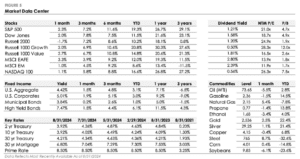
Investment advisory services offered through Retirement Wealth Advisors, Inc. (RWA), an SEC Registered Investment Advisor. Hoffman Financial Group and RWA are not affiliated. Investing involves risk, including the potential loss of principal. No investment strategy can guarantee a profit or protect against loss in periods of declining values. Opinions expressed are subject to change without notice and not intended as investment advice or to predict future performance. Past performance does not guarantee future results. Consult your financial professional before making any investment decision.
This information is designed to provide general information on the subjects covered. It is not, however, intended to provide specific legal or tax advice and cannot be used to avoid tax penalties or promote, market, or recommend any tax plan or arrangement. Please note that Hoffman Financial Group and its affiliates do not give legal or tax advice. You are encouraged to consult your tax advisor or attorney.
Annuity guarantees rely on the financial strength and claims-paying ability of the issuing insurer. Any references to protection benefits or lifetime income generally refer to fixed insurance products. They do not refer in any way to securities or investment advisory products or services. Fixed insurance and annuity product guarantees are subject to the claims-paying ability of the issuing company and are not offered by Retirement Wealth Advisors, Inc.
The Better Business Bureau (BBB) is a membership organization governed by The Council of BBBs, Inc. Businesses in the U.S. and Canada may apply for accreditation with their local BBB and are evaluated on eight BBB Standards of Trust, which are defined as a comprehensive set of best practices for how businesses should treat the public in a fair and honest manner. Businesses must pay a fee for accreditation review and monitoring for continued compliance to BBB standards when applying for accreditation. BBB assigns ratings to accredited businesses, which range from A+ (highest) to F (lowest) and are based on a defined set of rating elements. BBB logos and/or trademarks are property of their respective owners, and no endorsement of Chris Hoffman or Hoffman Financial Group is stated or implied. BBB and Retirement Wealth Advisors, Inc. (RWA) are not affiliated.
For the detailed requirements of the Better Business Bureau, please visit: https://www.bbb.org/
Logos and trademarks used are the property of their respective owners and no endorsement by the owners of the producer is stated or implied.
Hoffman Financial Group is not affiliated nor endorsed by any government agency.
Registered Investment Advisors and Investment Advisor Representatives act as fiduciaries for all of our investment management clients. We have an obligation to act in the best interests of our clients and to make full disclosure of any conflicts of interests, if any exist. Please refer to our firm brochure, the ADV 2A page 4, for additional information.
View All


